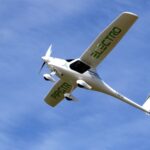Euro Airship, a company that develops rigid airships, will reach key milestones in 2024 as it seeks to bring its Solar Airship One project to fruition, said Marie-Christine Bilbow, CEO.
Speaking to FINN about her plans, Bilbow said the financing of the second phase of the programme – infrastructure and construction of the airship – by new sponsors would be completed this year.
“Following our successful speeches at Climate Week in New York and COP28 in Dubai, we have attracted many sponsors, with negotiations underway and the target close to being reached,” she said.
The main work will include construction of the hangar and its annexes, construction of the airship’s components, pilot training and certification follow-up.
Solar Airship One is a non-stop world tour flight with no fossil fuels and zero CO2 emissions intended to be the world’s first demonstration of a new low-carbon mobility solution.
Scheduled for 2026, the airship will fly over 40,000 kms in 20 days, following a trajectory close to the equator at an average altitude of 6,000m.
Euro Airship has been working for over 10 years with partners such as Capgemini, Groupe La Poste and Orange to achieve the industrialisation of its “zero-carbon” solution.
Commenting on the project, Bilbow said: “Airships will not replace planes, but [they] are an alternative type of air mobility. Airships are not direct competitors to planes, but thanks to their unrivalled qualities (low carbon, point-to-point delivery, direct trajectory, no need for heavy ground infrastructure, etc.), airships will open new markets in many areas: logistic, eco-tourism, surveillance, humanitarian support.”
She added: “We are at the dawn of a new sector that will address a new frequency of logistics. We are being closely watched in this respect, and our project is arousing a lot of envy, with prospects that are the stuff of dreams.
“Airships have the potential to play a unique and valuable role in the wider aviation ecosystem, particularly in the context of evolving transportation needs and sustainability concerns.
“They offer unique capabilities and advantages that could make them a valuable component of the wider aviation ecosystem.
“Their potential to enhance regional connectivity, provide sustainable transportation solutions, and serves needs makes them a subject of growing interest and exploration in the aviation industry.”
Subscribe to the FINN weekly newsletter

